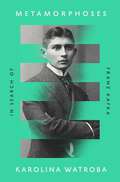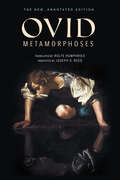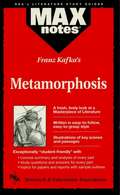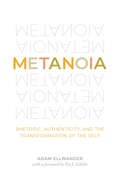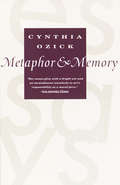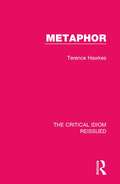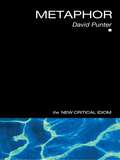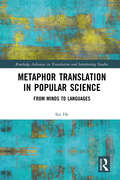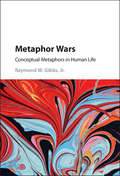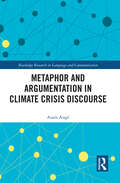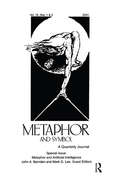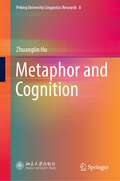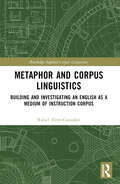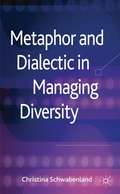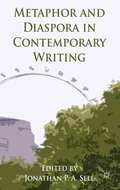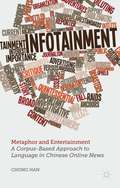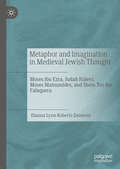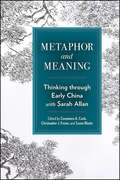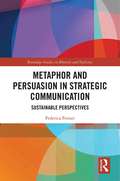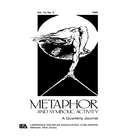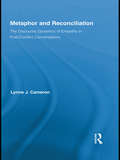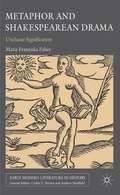- Table View
- List View
Metamorphoses: In Search of Franz Kafka
by Karolina WatrobaThis groundbreaking study of Franz Kafka&’s legacy—to be published during the centenary of his death in 2024—explores Kafka&’s life and influence in an entirely new and dynamic way.In 2024, exactly one hundred years after his death at the age of forty, readers all over the world will reach for the works of Franz Kafka. Many of them will want to learn more about the enigmatic man behind the classic books filled with mysterious courts and monstrous insects. Who, exactly, was Franz Kafka? Karolina Watroba, the first Germanist ever elected as a fellow of Oxford's All Souls College, will tell Kafka's story beyond the boundaries of language, time, and space, traveling from the Prague of Kafka's birth through the work of contemporary writers in East Asia, whose award-winning novels are, in part, homages to the great man himself. Metamorphoses presents a non-chronological journey through Kafka's life, combining literary scholarship with the responses of his readers throughout the last century. It is a both an exploration of Kafka's life and an exciting new way of approaching literary history.
Metamorphoses: The New, Annotated Edition
by Rolfe Humphries Ovid Joseph D. Reed"So easy to read that one may have to think twice to realize these tales are nearly 2,000 years old." –Washington Post "One of the most captivating books ever written" —The New York Times Ovid’s Metamorphoses is one of the most influential works of Western literature, inspiring artists and writers from Titian to Shakespeare to Salman Rushdie. These are some of the most famous Roman myths as you’ve never read them before—sensuous, dangerously witty, audacious—from the fall of Troy to birth of the minotaur, and many others that only appear in the Metamorphoses. Connected together by the immutable laws of change and metamorphosis, the myths tell the story of the world from its creation up to the transformation of Julius Caesar from man into god. In the ten-beat, unrhymed lines of this now-legendary and widely praised translation, Rolfe Humphries captures the spirit of Ovid’s swift and conversational language, bringing the wit and sophistication of the Roman poet to modern readers. This special annotated edition includes new, comprehensive commentary and notes by Joseph D. Reed, Professor of Classics and Comparative Literature at Brown University.
Metamorphosis (MAXNotes Literature Guides)
by Stanley TaikeffMAXnotes offer a fresh look at masterpieces of literature, presented in a lively and interesting fashion. Written by literary experts who currently teach the subject, MAXnotes will enhance your understanding and enjoyment of the work. MAXnotes are designed to stimulate independent thought about the literary work by raising various issues and thought-provoking ideas and questions. MAXnotes cover the essentials of what one should know about each work, including an overall summary, character lists, an explanation and discussion of the plot, the work's historical context, illustrations to convey the mood of the work, and a biography of the author. Each chapter is individually summarized and analyzed, and has study questions and answers.
Metanoia: Rhetoric, Authenticity, and the Transformation of the Self
by Adam EllwangerWestern culture is in a moment when wholly new kinds of personal transformations are possible, but authentic transformation requires both personal testimony and public recognition. In this book, Adam Ellwanger takes a distinctly rhetorical approach to analyzing how the personal and the public relate to an individual’s transformation and develops a new vocabulary that enables a critical assessment of the concept of authenticity. The concept of metanoia is central to this project. Charting the history of metanoia from its original use in the classical tradition to its adoption by early Christians as a term for religious conversion, Ellwanger shows that metanoia involves a change within a person that results in a truer version of him- or herself—a change in character or ethos. He then applies this theory to our contemporary moment, finding that metanoia provides unique insight into modern forms of self-transformation. Drawing on ancient and medieval sources, including Thucydides, Plato, Paul the Apostle, and Augustine, as well as contemporary discourses of self-transformation, such as the public testimonies of Caitlyn Jenner and Rachel Dolezal, Ellwanger elucidates the role of language in signifying and authenticating identity. Timely and original, Ellwanger’s study formulates a transhistorical theory of personal transformation that will be of interest to scholars working in social theory, philosophy, rhetoric, and the history of Christianity.
Metanoia: Rhetoric, Authenticity, and the Transformation of the Self (G - Reference, Information And Interdisciplinary Subjects Ser.)
by Adam EllwangerWestern culture is in a moment when wholly new kinds of personal transformations are possible, but authentic transformation requires both personal testimony and public recognition. In this book, Adam Ellwanger takes a distinctly rhetorical approach to analyzing how the personal and the public relate to an individual’s transformation and develops a new vocabulary that enables a critical assessment of the concept of authenticity. The concept of metanoia is central to this project. Charting the history of metanoia from its original use in the classical tradition to its adoption by early Christians as a term for religious conversion, Ellwanger shows that metanoia involves a change within a person that results in a truer version of him- or herself—a change in character or ethos. He then applies this theory to our contemporary moment, finding that metanoia provides unique insight into modern forms of self-transformation. Drawing on ancient and medieval sources, including Thucydides, Plato, Paul the Apostle, and Augustine, as well as contemporary discourses of self-transformation, such as the public testimonies of Caitlyn Jenner and Rachel Dolezal, Ellwanger elucidates the role of language in signifying and authenticating identity. Timely and original, Ellwanger’s study formulates a transhistorical theory of personal transformation that will be of interest to scholars working in social theory, philosophy, rhetoric, and the history of Christianity.
Metaphor
by Denis DonoghueDenis Donoghue turns his attention to the practice of metaphor and to its lesser cousins, simile, metonym, and synecdoche. Metaphor ("a carrying or bearing across") supposes that an ordinary word could have been used in a statement but hasn't been. Instead, something else, something unexpected, appears. The point of a metaphor is to enrich the reader's experience by bringing different associations to mind. The force of a good metaphor is to give something a different life, a new life. The essential character of metaphor, Donoghue says, is prophetic. Metaphors intend to change the world by changing our sense of it. At the center of Donoghue's study is the idea that metaphor permits the greatest freedom in the use of language because it exempts language from the local duties of reference and denotation. Metaphors conspire with the mind in its enjoyment of freedom. Metaphor celebrates imaginative life par excellence, from Donoghue's musings on Aquinas' Latin hymns, interspersed with autobiographical reflection, to his agile and perceptive readings of Wallace Stevens. When Donoghue surveys the history of metaphor and resistance to it, going back to Aristotle and forward to George Lakoff, he is a sly, cogent, and persuasive companion. He also addresses the question of whether or not metaphors can ever truly die. Reflected on every page of Metaphor are the accumulated wisdom of decades of reading and a sheer love of language and life.
Metaphor
by L. David Ritchie'Metaphor', a form of figurative language in which one thing or idea is expressed in terms of another, is becoming an increasingly popular area of study, as it is relevant to the work of semanticists, pragmatists, discourse analysts and also those working at the interface of language and literature and in other disciplines such as philosophy and psychology. This book provides a summary, critique and comparison of the most important theories on how metaphors are used and understood, drawing on research from linguistics, psychology and other disciplines. In order to ground the discussion in actual language use, the book uses examples from discourse, including casual conversations, political speeches, literature, humor, religion and science. Written in a non-technical style, the book includes clear definitions, examples, discussion questions and a glossary, making it ideal for graduate-level seminars.
Metaphor & Memory
by Cynthia OzickFrom the author of The Messiah of Stockholm and Art and Ardor comes a new collection of supple, provocative, and intellectually dazzling essays. In Metaphor & Memory, Cynthia Ozick writes about Saul Bellow and Henry James, William Gaddis and Primo Levi. She observes the tug-of-war between written and spoken language and the complex relation between art's contrivances and its moral truths. She has given us an exceptional book that demonstrates the possibilities of literature even as it explores them.
Metaphor (The Critical Idiom Reissued #24)
by Terence HawkesFirst published in 1972, this work examines the complex concept of metaphor. It defines the term by placing the various key ideas about the nature of metaphor in their literary and social context, and in doing so, it traces the developing history of the concept. This account has considerable range, beginning with Aristotle and ending with the work of modern linguist and anthropologists. From this analysis emerge two opposed yet complementary ideas: the classical view of metaphor, which sees metaphor as a detachable device imported into language, and the romantic view, which sees metaphor as inseparable from language. This book will be of interest to those studying English literature and language.
Metaphor (The New Critical Idiom)
by David PunterMetaphor is a central concept in literary studies, but it is also prevalent in everyday language and speech. Recent literary theories such as postmodernism and deconstruction have transformed the study of the text and revolutionized our thinking about metaphor. In this fascinating volume, David Punter: establishes the classical background of the term from its philosophical roots to the religious and political tradition of metaphor in the East relates metaphor to the public realms of culture and politics and the way in which these influence the literary examines metaphor in relation to literary theory, philosophy, psychoanalysis and postcolonial studies illustrates his argument with specific examples from western and eastern literature and poetry. This comprehensive and engaging book emphasizes the significance of metaphor to literary studies, as well as its relevance to cultural studies, linguistics and philosophy.
Metaphor Translation in Popular Science: From Minds to Languages (Routledge Advances in Translation and Interpreting Studies)
by Sui HeThis book explores the intersection of metaphor studies and translation studies, specifically focusing on popular scientific articles.The volume complements existing work on conceptual metaphor theory in translation by aligning it with conceptual blending theory to demonstrate how an integrated approach offers a more expansive understanding of the cognitive and linguistic dimensions of metaphor translation. It includes an essential introduction to the key concepts and theories in metaphor studies and metaphor translation research, discerning the importance of localising theories from neighbouring disciplines, such as metaphor studies, for advancing interdisciplinary research in translation studies. Sui He applies this approach to popular cosmological discourse, analysing examples from articles in Scientific American and their Chinese translations, allowing for a nuanced examination of translation strategies adopted by translators at both cognitive and linguistic levels, which presents the circulation and transformation of popular cosmological knowledge from English in two Chinese-mediated communities.This book will be of interest to students and scholars in translation studies, metaphor studies, and discourse analysis.
Metaphor Wars
by Gibbs Raymond W. Jr.The study of metaphor is now firmly established as a central topic within cognitive science and the humanities. We marvel at the creative dexterity of gifted speakers and writers for their special talents in both thinking about certain ideas in new ways, and communicating these thoughts in vivid, poetic forms. Yet metaphors may not only be special communicative devices, but a fundamental part of everyday cognition in the form of 'conceptual metaphors'. An enormous body of empirical evidence from cognitive linguistics and related disciplines has emerged detailing how conceptual metaphors underlie significant aspects of language, thought, cultural and expressive action. Despite its influence and popularity, there have been major criticisms of conceptual metaphor. This book offers an evaluation of the arguments and empirical evidence for and against conceptual metaphors, much of which scholars on both sides of the wars fail to properly acknowledge.
Metaphor and Argumentation in Climate Crisis Discourse (Routledge Research in Language and Communication)
by Anaïs AugéThis volume sheds light on the argumentative role of metaphor in climate change discourse, unpacking the ways in which stakeholders use specific metaphors to influence perceptions of the climate crisis. While existing research has explored the explanatory function of metaphors in communication on climate change, this book offers an alternative view, one which posits that metaphors can go beyond disseminating scientific observations to promoting biases in the depiction of these observations. Augé analyses oft-used ideas in climate change communication, such as greenwashing, drawn from a wide-ranging corpus spanning media discourse, scientific discourse, NGO communications, political speech, and social media messages in English. The book presents an overview of different arguments conveyed through metaphors around five key themes—climate change mitigation; the evolution of climate change; global and local effects; the significance of climate change in specific countries; and the relationship between climate change and other contemporary social issues. The volume highlights how the complexity of climate change often necessitates the use of metaphor and the value of further research on the argumentative function of metaphor in elucidating its ideological dimensions in climate crisis discourse. This book will be of interest to scholars in discourse analysis, corpus linguistics, cognitive linguistics, and environmental communication.
Metaphor and Artificial Intelligence: A Special Double Issue of metaphor and Symbol
by John M. KennedyThis special issue arose out of a symposium on metaphor and artificial intelligence in which the main orientation was computational models and psychological processing models of metaphorical understanding. The papers in this issue discuss: *implemented computational systems for handling different aspects of metaphor understanding; *how metaphor can be accommodated in accepted logical representational frameworks; *psychological processes involved in metaphor understanding; and *the cross-linguistic cognitive reality of conceptual metaphors.
Metaphor and Cognition (Peking University Linguistics Research #8)
by Zhuanglin HuThis book collects virtually all research perspectives on metaphor in the field of cognitive linguistics. Moreover, it presents a comprehensive range of research methods for metaphor including qualitative and quantitative methods and the combination of the two. For example, critical metaphor analysis, metaphor interpretation, metaphor experiments, neuro method, and so on are all explained in detail.
Metaphor and Corpus Linguistics: Building and Investigating an English as a Medium of Instruction Corpus (Routledge Applied Corpus Linguistics)
by Rafael Alejo-GonzálezMetaphor and Corpus Linguistics: Building and Investigating an English as a Medium of Instruction Corpus offers a model for building a corpus of oral EMI seminars. It demonstrates how incorporating metaphor to the process of corpus building affords a more comprehensive description of the role of metaphor in discourse. EMI is the specific context outlined in this volume, and as such it will be of particular interest to researchers in this area, though the design and model can be easily generalised and applied to other corpora focusing on metaphor. Alejo-González argues for the need to build such a corpus given the scarcity of corpora being tagged for metaphor as well as the shortage of those dealing with the EMI phenomenon. This book will be of practical use and interest to those researchers of corpus linguistics or related areas looking to explore metaphor through their corpus studies.
Metaphor and Dialectic in Managing Diversity
by Christina SchwabenlandMetaphor and dialectic are modes of thinking that influence the ways in which we identify what we have in common with others, how we differ and how we manage this diversity to achieve organizational goals. This book explores how we can become more aware of these unconscious processes and challenge stereotypes.
Metaphor and Diaspora in Contemporary Writing
by Jonathan P. A. SellChoose ten major contemporary diasporic writers (from Abdulrazak to Zadie), ask ten leading authorities to write about their use of metaphor, and this is the result: a timely reassertion of metaphor's unrivalled capacity to encompass sameness and difference and create understanding and empathy across boundaries of nationality, race and ethnicity.
Metaphor and Entertainment
by Chong HanMetaphor and Entertainment presents the very first, large-scale exploration of metaphor in Chinese online entertainment news, one of the most vibrant and controversial news genres in contemporary China.
Metaphor and Imagination in Medieval Jewish Thought: Moses ibn Ezra, Judah Halevi, Moses Maimonides, and Shem Tov ibn Falaquera
by Dianna Lynn Roberts-ZaudererThis book reveals how Moses ibn Ezra, Judah Halevi, Moses Maimonides, and Shem Tov ibn Falaquera understood metaphor and imagination, and their role in the way human beings describe God. It demonstrates how these medieval Jewish thinkers engaged with Arabic-Aristotelian psychology, specifically with regard to imagination and its role in cognition. Dianna Lynn Roberts-Zauderer reconstructs the process by which metaphoric language is taken up by the imagination and the role of imagination in rational thought. If imagination is a necessary component of thinking, how is Maimonides’ idea of pure intellectual thought possible? An examination of select passages in the Guide, in both Judeo-Arabic and translation, shows how Maimonides’ attitude towards imagination develops, and how translations contribute to a bifurcation of reason and imagination that does not acknowledge the nuances of the original text. Finally, the author shows how Falaquera’s poetics forges a new direction for thinking about imagination.
Metaphor and Meaning: Thinking Through Early China with Sarah Allan (SUNY series in Chinese Philosophy and Culture)
by Constance A. Cook; Christopher J. Foster; Susan BladerIn Metaphor and Meaning, scholars from China, the United States, and Europe draw on Sarah Allan's groundbreaking application of conceptual metaphor theory to the study of early Chinese philosophy and material culture. Conceptual metaphor theory treats metaphors not just as linguistic expressions but as fundamental structures of thought that define one's conceptual system and perception of reality. To understand another culture's worldview, then, hinges upon identifying the right metaphors, through which it then becomes possible to navigate between shared and unshared experiences. The contributors pursue lines of argument that complement, enhance, or challenge Allan's prior investigations into these root metaphors of early Chinese philosophy, whether by explicitly engaging with conceptual metaphor theory or, more indirectly, by addressing meaning construction in a broader sense. Like Allan's interpretative works, Metaphor and Meaning interrogates both transmitted traditions and newly unearthed archaeological finds to understand how people in early China thought about the cosmos, society, and themselves.
Metaphor and Persuasion in Strategic Communication: Sustainable Perspectives (Routledge Studies in Rhetoric and Stylistics)
by Federica FerrariThis groundbreaking work adopts an alternative metaphor-based approach to challenge, unpack, and redefine our understanding of persuasion and strategic communication and the extents to which they shape political discourse. The book’s theoretical and methodological grounding in metaphor allows for an alternative perspective on strategic communication but also a robust discussion of both persuasion and other kinds of related discursive processes at work in political communication, including narrative, identification, and ideology. The volume integrates case studies from prominent political discourses, including those of George W. Bush, Jr., Tony Blair, and Barack Obama, to highlight the crucial role of persuasion management and sustainability in the public sphere and the ways in which it might inform political action and change in a positive way. Broadening our perception of the possibilities of persuasion and strategic communication, this dynamic volume is key reading for students and scholars in communication studies, political science, rhetoric, and cognitive linguistics.
Metaphor and Philosophy: A Special Issue of metaphor and Symbolic Activity
by Unknown AuthorDuring the last 15 years, cognitive scientists have discovered things about the nature and importance of metaphor that are startling because of their radical implications for metaphor research and because they require us to rethink some of our most fundamental received notions of meaning, concepts, and reason. Many of the theoretical assumptions that guided earlier generations who worked on metaphor have been undermined by this new research, which has profound implications for philosophy. More specifically, the level of methodological sophistication of empirical studies of metaphor has increased markedly, making possible rigorous, detailed analyses of how metaphors actually structure conceptualization and reasoning. In addition, professionals have learned that metaphor is not merely a linguistic phenomenon but more fundamentally a conceptual and experiential process that structures the world. The articles in this special issue make significant contributions to these advances.
Metaphor and Reconciliation: The Discourse Dynamics of Empathy in Post-Conflict Conversations
by Lynne J. CameronSixteen years after her father was killed by an IRA bomb, Jo Berry had her first conversation with the man responsible. She had made a long journey, ‘walking the footsteps of the bombers’ as she put it, determined not to give in to anger and revenge but to try to understand his motivations and perspective. Her preparedness to meet Pat Magee opened up a path to empathy that developed through their conversations over the following years. This book studies their growing understandings of each other by focusing on the rich networks of metaphors that appear in their conversations, and how these evolve in the process of reconciliation. The innovative research method, reported in a rigorous but accessible style, together with the rich and often poignant data, make this book a valuable addition to the study of metaphor and discourse. In uncovering the development of empathy between these two extraordinary people, Cameron illuminates the moral necessity, and the potential rewards, in trying to imagine the world and mind of the Other. Implications are drawn for how mediators in reconciliation contexts might make positive use of metaphor in supporting the dynamics of empathy.
Metaphor and Shakespearean Drama
by Maria Franziska FaheyMetaphor and Shakespearean Drama explores the fruitful and potentiallydisorderly nature of metaphorical utterances in Shakespearean drama. Borrowing its title from Henry Peacham's 1593 warning that 'there be no uncleane or unchast e] signification contained in the Metaphore, ' it explores the worry expressed in Elizabethan rhetoric books that a metaphor might beget illegitimate meanings. Shakespeare's plays demonstrate that a metaphor can indeed generateunruly meanings which, once uttered, have the power to transform a community. Analyses of Othello, Titus Andronicus, Macbeth, King Henry IV Part 1, Hamlet, and The Tempest demonstrate various aspects of metaphoric performance. Theseinclude metaphor's power to import discourses into speech communities; metaphor's sacrificial nature; the relationship between metaphor and equivocation; metaphor's carnivalesque qualities; dead metaphor's ability to haunt living speech; and metaphor'sability to circulate unacknowledged collective fantasies. "
